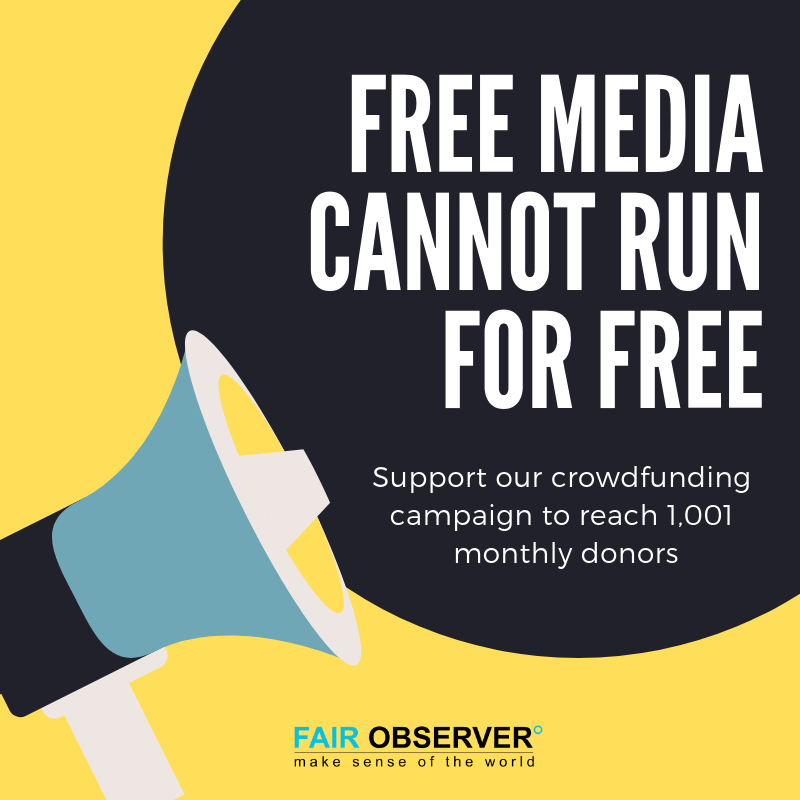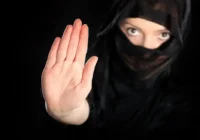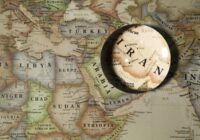In this edition of The Interview, Fair Observer talks to Peter Riddell, vice-principal at the Melbourne School of Theology in Australia.
Islamophobia can be seen in a variety of ways. As a form of intolerance and discrimination, it risks affecting relations between Muslims and non-Muslims and undermining social cohesion.
In 2018, the All Party Parliamentary Group on British Muslims made history by devising the first working definition of Islamophobia in the UK. The group noted in its report that “Islamophobia is rooted in racism and is a type of racism that targets expressions of Muslimness or perceived Muslimness.”
Tell MAMA, an organization that tracks anti-Muslim incidents in Britain, recorded a total of 685 racially-aggravated incidents between January and June 2018. The report found that 58% of victims were women. Hate crimes in the UK soared dramatically after the recent terrorist attacks at two mosques in Christchurch, New Zealand. In the week after the shooting, anti-Muslim incidents across Britain increased by 593%.
In the US, studies have been carried out regarding the perception of Muslim Americans. A 2018 survey by New America found that one-in-three people “would be concerned if a mosque or Islamic center was built in their neighborhood.” It also revealed that more than half of non-Muslim Americans are worried about the rise of extremism within Muslim communities in the United States.
Manifestations of Islamophobia include verbal threats, physical attacks on people and properties, and the demonization of Muslims in the media. In December 2018, the European Commission hosted a high-level conference on tackling intolerance and discrimination against Muslims in the EU. The commission also appointed a new coordinator on combating anti-Muslim hatred in July 2018. The need for taking action against Islamophobia was underlined by “persistent intolerance and racism against Muslims in the EU, as well as to structural forms of discrimination,” including in access to employment and education for people with a Muslim background.
In this edition of The Interview, Fair Observer talks to Peter Riddell, vice-principal at the Melbourne School of Theology, about Islamophobia in the West.
The interview was conducted at the end of 2018 via a written transcript, which has been edited for clarity.
Kourosh Ziabari: How serious is Islamophobia in the modern world? What are the root causes of growing prejudice and bias against Muslims in the West?
Peter Riddell: Any discussion about prejudice should aim to reduce or, ideally, eliminate it. In that context, prejudice by one community toward another needs also to take account of similar prejudice in the opposite direction. So to discuss Islamophobia, namely prejudice against Muslims in the West, without also considering “Westophobia,” or prejudice against Westerners by Muslims, is like looking at a painting and deliberately covering one eye.
There are many causes of mutual prejudice between Muslims and Westerners. History is a factor. Simply put, wars between Christian Europeans and Muslims have taken place on and off since the seventh century and have left a legacy of painful memories and mutual distrust. And both parties need to repent in this regard. It’s disingenuous to lament Crusader actions at Jerusalem in 1099 without also lamenting Ottoman actions at Constantinople in 1453.
As for the modern world today, I am not convinced that prejudice and bias against Muslims in the West is growing, nor is prejudice and bias against Westerners in Muslim-majority countries necessarily growing. Mass communications and ever-expanding social media may cause some problems, such as focusing on rivalries rather than relationships. But, on a more positive note, they also enable people to see the human face of others who are at a distance, rather than just seeing a negative stereotype. It is far easier today for Westerners to meet Muslims, hear Muslim opinions and share experiences with Muslims — and vice-versa — than it was a generation ago. This is all good for breaking down of stereotypes.
So, personally, I am optimistic that, in spite of continuing mutual prejudices between Westerners and Muslims, the situation is improving as there is more interaction between the two, both in real life and in cyberspace.
Ziabari: Critics of Islam argue that the religion promotes and endorses violence against non-Muslims and is to blame for conflicts across the globe. Is this true? Does Islam encourage violence and aggression?
Riddell: The question assumes that Islam is a monolith. Is there one Islam or are there many Islams? Certainly there is one Quran, and Prophet Muhammad plays a unique role in Islam, but both brought complex messages that are interpreted in different ways by different groups of Muslims.
I notice that radical Islamist groups and more peaceful moderate Islamic groups are both able to quote verses from the Quran and examples from the life of Muhammad in support of their policies and practices. As a non-Muslim, I would not presume to reject the Islamic credentials of any of these groups. What I see is that while some Muslims pursue violence and aggression, more Muslims do not. Who are the true Muslims? That’s not for me to say — that’s for Muslims to resolve.
So, non-Muslim Westerners are left in a quandary, because they are presented with conflicting messages and actions by different groups, all who claim to be basing themselves on the same Quran and following the same prophet.
Ziabari: The pundits and scholars who criticize Islam often fail to reprimand ultra-nationalists and far-right extremists for encouraging a narrative of hatred against immigrants and Muslims. Doesn’t their silence on the growth of xenophobic and racist rhetoric sound duplicitous?
Riddell: There is widespread criticism of “ultra-nationalists and far-right extremists” in Western political and social discourse in both mainstream and social media. Consider responses to the Charlottesville rally of August 2017. It was widely condemned by commentators from all political sectors. Any of the main Western media outlets include acknowledgements of the challenge posed by far-right groups.
But the question asks about “the pundits and scholars who criticize Islam.” This needs further clarification. Who does this refer to? A conservative group such as the Middle East Forum is sometimes critical of groups such as the Council on American-Islamic Relations, but at the same time was highly critical of the Charlottesville rally.
It is important in such discussions not to use caricatures of particular groups as if clear lines of division exist. In fact, both Muslim and non-Muslim communities are more like a continuum, with attitudes blurring between sub-groups. This is where stereotypes are unhelpful, as they tend to ignore the complexity that lies in the positions that different groups take.
Ziabari: Do you think leaders of Islam and Christianity are prepared to shape a discourse around how to bridge gaps that keep Muslims and Christians away from each other and stimulate inter-faith dialogue?
Riddell: There is a huge amount of effort being put into interfaith dialogue these days. This has been particularly noticeable since the 9/11 attacks, so we need to recognize and give credit to those Christian and Muslim leaders who have been trying to build bridges between the communities in order to ensure that past conflicts are replaced by future cooperation. Of course, more can always be done, and faith leaders are always trying to explore new ways of bridge-building. But let us give credit to dialogue initiatives that have proliferated in recent years, such as the Building Bridges seminar; the various activities under the Common Word initiative; specific interactions between, for example, the pope and the grand imam of Al-Azhar; interactions between Christian groups and Shia authorities from Iran; and countless other initiatives.
The media have an important role to play in bridge-building between Christians and Muslims, and the Western and Muslim worlds. It is important that media reports contribute to positive bridge-building rather than exacerbating differences. This goes back to the question of negative stereotyping and perpetuating of prejudicial views. Prejudice is transmitted in many ways, including by mass media. Both Western media and Muslim media have played a role in stoking the files of prejudice. Responsible media reporting will help, rather than hinder, improve relations between Western and Muslim countries.
Ziabari: Is Islamophobia taken seriously by governments in the West as a threat to multiculturalism that needs to be countered?
Riddell: Ironically, Islamophobia among Westerners is taken far more seriously by governments in the West than Westophobia among Muslims. For example, in 1997 the British government commissioned an important report by the Runnymede Trust on Islamophobia in British mainstream media. It provided solid evidence of Islamophobic attitudes and comment in the media, but failed to note clear Westophobic commentary in British Muslim media. The same body issued a 20th anniversary updated report on Islamophobia in late 2017, which pointed to ongoing anti-Muslim prejudice, but again failed to subject Muslim media to the same kind of scrutiny as Western media, in order to determine whether negative stereotyping was bi-directional, which it clearly is.
Over the past 20 years, I have lived in both Britain and Australia and noticed that discussions about Islamophobia are frequent and take place at the highest levels. In Britain, the recent report entitled, “The Missing Muslims: Unlocking British Muslim Potential for the Benefit of All” is being considered by the British government as the basis of new policies to address Islamophobia. But there is a deafening silence in Western political contexts about toxic anti-Western comment in Muslim media outlets. Moreover, I see little evidence that majority Muslim governments are willing to address such anti-Western prejudice in much Muslim media in the Middle East and elsewhere.
Ziabari: Do you agree that anti-immigrant, anti-Muslim rhetoric of US President Donald Trump has caused great damage to Muslims worldwide and stoked fear of Islam as a religion more than before?
Riddell: We need to be precise in what we are referring to here. The Trump administration’s Executive Order 13780 imposes bans on various kinds of travel to the US for citizens of Libya, Yemen, Iran, Somalia, Syria, North Korea and on some government officials of Venezuela. Most, but not all, of these countries have Muslim majorities.
The problem with the kind of rhetoric and bans that have been issued by the Trump administration is that decent, law-abiding Muslims from the specified countries are caught up in legislation designed to target Islamist radicals. This creates and reinforces stereotypes on both sides: among some Americans who think that all Muslims are the same, and among some Muslims who think all Americans are the same.
It is important to note that there is significant opposition to these Trump administration policies within the US, both from individual state authorities and from nongovernment groups. These opposition groups gain significant leverage within the US media, ensuring that the debate around Muslim issues in the US is far from monolithic.
Ziabari: What do you think law-abiding Muslims living in the West should do in order to be immune to the repercussions of anti-Muslim prejudice that permeates these societies and has set about to grow under the shadow of far-right extremism, Brexit, Trump and the 9/11 attacks before them?
Riddell: There are big assertions built into the question. I do not agree that “anti-Muslim prejudice permeates Western societies,” nor do I agree that lslamophobia is a growing phenomenon, given the significant steps taken by Western governments, church leaders and many social groups to show the human face of Muslim minorities living in the West.
But the heart of the question is about what law-abiding, committed Muslims living in the West should do. Such Muslims should continue to do a number of good things that they are already doing.
First, they should continue to engage with the non-Muslim society around them in efforts of friendship, showing interest in the cultural and religious heritage of those non-Muslim communities. Second, such Muslims should seek at all times to distance themselves from the actions of radical Islamist groups, rather than remaining silent. If there is a terrorist attack in a Western location — and there will be more — law-abiding Muslims should demonstrate against these attacks with statements of “not in my name.” Moreover, they should also report to security authorities if they hear of any subversive activity that is planned.
 What law-abiding Muslims could do more of is to ensure that the media outlets within their own communities do not include messages of hostility and prejudice toward the Western societies that they have adopted and that have embraced them.
What law-abiding Muslims could do more of is to ensure that the media outlets within their own communities do not include messages of hostility and prejudice toward the Western societies that they have adopted and that have embraced them.
Ziabari: Reports about Islamophobic hate crimes in Europe, North America and Australia make the news headlines frequently these days. Are law enforcement authorities lenient on the perpetrators? Has it become an accepted convention for hijab-wearing women to be assaulted or Arabic-speaking men to be attacked in public?
Riddell: Here we are again talking about prejudice between communities, and so we need to consider both cases where Muslims are victims and also cases where Muslims are perpetrators.
After a terrorist incident in Sydney, Australia, in 2014 carried out by Mohammed Hassan Manteghi Borujerdi, an Iranian refugee to Australia, some Muslims feared an lslamophobic backlash, and there was verbal abuse against some Muslims by some non-Muslim Australians. However, it has certainly not become an “accepted convention” for Muslim women or men to be abused in public in Australia or any other Western country for showing outward symbols of identity. For example, note the compassionate response by many Australians to the Sydney 2014 incident in the form of the “I’ll ride with you” campaign, when non-Muslim people offered to accompany Muslims on daily travel as a public statement of solidarity and friendship.
From the other perspective, there are frequent reports of discrimination and at times persecution of Christian minorities in Muslim-majority countries, with churches attacked and Christian individuals threatened. In such circumstances, it is always heartening for these Christians to see cases where Muslims protect churches and offer support, such has occurred in Egypt, Indonesia and other locations.
As for whether the law enforcement authorities in these countries are lenient on perpetrators of anti-Muslim or anti-Christian verbal or physical abuse, generally I believe that these authorities do what they can to punish offenders within the limits of the law. But more needs to be done and legislation needs to be constantly reviewed to ensure that it is keeping up with community realities.
Ziabari: What role can Muslim intellectuals, scholars and public figures play in breaking stereotypes about their faith and resisting dehumanization by the media and right-wing politicians?
Riddell: Realistically, there will always be stereotypes, so it is more a matter of reducing them rather than breaking them. Stereotypes derive from a number of factors, including ignorance but also including media misrepresentations. So, I think Muslim intellectuals, scholars and public figures should continue the good work they are doing at present in seeking to inform Western populations about the faith of Islam and the diversity of Muslim people. Muslim media outlets are playing a role in this regard, and considerable resources have been put into Islamic TV channels and print media in the West.
But I always find it far more powerful when spokespeople for one community advocate on behalf of another community. Both Westerners and Muslims should consciously ask how their own communities have contributed to problems, rather than always pointing fingers at the other community. Westerners, including Christians, should advocate for fair representation of Muslims in the West, and Muslims should advocate for Christians in the Muslim world and seek to overcome negative stereotypes of the West in Muslim media.
We all have a role play here. Even this present interview needs to ensure that it is contributing to better relations between the West and Islam, rather than exacerbating age-old tensions. If we feed historic suspicions between Westerners and Muslims of each other, we must share the responsibility for bad outcomes.
The views expressed in this article are the author’s own and do not necessarily reflect Fair Observer’s editorial policy.
Support Fair Observer
We rely on your support for our independence, diversity and quality.
For more than 10 years, Fair Observer has been free, fair and independent. No billionaire owns us, no advertisers control us. We are a reader-supported nonprofit. Unlike many other publications, we keep our content free for readers regardless of where they live or whether they can afford to pay. We have no paywalls and no ads.
In the post-truth era of fake news, echo chambers and filter bubbles, we publish a plurality of perspectives from around the world. Anyone can publish with us, but everyone goes through a rigorous editorial process. So, you get fact-checked, well-reasoned content instead of noise.
We publish 2,500+ voices from 90+ countries. We also conduct education and training programs
on subjects ranging from digital media and journalism to writing and critical thinking. This
doesn’t come cheap. Servers, editors, trainers and web developers cost
money.
Please consider supporting us on a regular basis as a recurring donor or a
sustaining member.
Will you support FO’s journalism?
We rely on your support for our independence, diversity and quality.






